Lessons from the D.C. Dyke March
I initially set out to write an essay about my experience as a queer woman in the Jewish community, or maybe about being a Jewish woman in the LGBT community. Then, last week at the D.C. Dyke* March, as articles in The Forward, Haaretz, and other publications breathlessly announced, “Israeli and Jewish Symbols [were] Banned on Pride Flags.” And here I am, talking not about queerness or about Judaism, but about Israel again.
These headlines—“Jewish Symbols Banned”—were misleading. The march organizers, spearheaded by Jewish women, specifically banned the rainbow flag with a Magen David in the center, composed to look like the Israeli flag. It was banned, the organizers stated, because in their eyes it is a symbol of nationalism and imperialism. “If someone would show up with an American flag but with the stripes as a rainbow, we would treat it the same way,” said Yael Horowitz, one of the D.C. Dyke March organizers. All other symbols of Judaism, such as a yarmulke, a tallit, a chai symbol, a Magen David on a necklace, or even a Magen David on a flag that is not centered but is instead moved over to the side, were welcome and encouraged.
I am tired of talking about Israel. My LGBT Jewish friends are too—we vent in our private group texts about how we wish we could exist in a Judaism that does not bind us to a settler-colonial state. Like one of my friends said, it is often easier to advocate on issues that are close to home, rather than spend my energy trying to fight an apartheid state half a world away. But I believe that as long as atrocities are being done in my name as a Jew, it is my duty to stand publicly against them. It is my duty to listen to Palestinians, and to try to build a more loving and brave Jewish community. It is my duty to talk about what happened at the D.C. Dyke March.
The Dyke March was brought back to D.C. this year after a decade-long hiatus. The March acts as an attempt to create a more serious and political alternative to the corporate and glittery parade that D.C. Pride, like many other Pride parades across the country, has become. The theme of the D.C. Dyke March this year was “Dykes against Displacement,” both in D.C. and elsewhere. It was an assertion that queer issues must intersect with other issues, and that our activism cannot be based solely on our LGBT identities. This seems reasonable, and feels like politics I deeply believe in. And yet, these same politics led to a debate over where a star can be placed on a flag.
So, do I think that banning flags with a star in the center will somehow undo the Nakba, or create a just world for Palestinians? Of course not. I don’t know if this was the best way for the organizers to express their solidarity with Palestinian suffering, and I don’t know what a better way would have looked like.
However, rather than dwelling on what could or should have been done, I can write about what was done: A group billing itself as a “Zionist Feminist” organization, Zioness, organized a counter-protest at the Dyke March. This protest—which, based on photos on Twitter, seemed to consist of many straight-presenting male individuals—was made up of people that would not have been part of the Dyke March’s constituency in the first place. Yet, these people, some of whom held actual Israeli flags, inserted themselves into a space meant to amplify “the displaced.”
I don’t think that this ending was a victory for Jews or for the LGBT community. In the end, Judaism was yet again conflated with Israel—something I don’t imagine even Israel-supporting Jews particularly want—and the Dyke March organizers caved under pressure and allowed even the marchers who were simply carrying Israeli flags in with the rest of the group. Most of the pressure for them to allow this seemed to come from outside the LGBT community, from those who the march was not for in the first place.
According to Nylah Burton, a Black and Jewish writer, this choice ultimately hurt more than it healed. As Burton said in a Twitter thread on the day of the March: “It probably felt horrible, invalidating, and unsafe to be a queer Palestinian at the #dcdykemarch with Israeli flags...I’m thinking about how symbols of British and American nationalism make me feel unsafe and I can empathize with this....This is not equality. To be forced to march alongside the flag that has condoned the displacement of your family….We don’t listen to or value Palestinians lives and it’s heartbreaking.”
At the D.C. Dyke March, no one won. A conversation that was meant to center Palestinian suffering became a fight between Jews about whether or not a rainbow flag with a Star of David looked similar enough to a blue and white flag with a Star of David to be offensive. But now it’s over, and organizers, LGBT people, Jews, and leftists must ask ourselves: What can we learn from this?
As LGBT organizers, we must make sure policies regarding nationalistic symbols—of any kind—are firmly in place long before our events start. As Jews, we need to think about the spaces we inhabit, and how we might express pride in our Jewish identities (which is absolutely vital to our collective liberation!) without also limiting the liberation of others. In addition, I think it’s important that people acknowledge that the Magen David is more than just a symbol that violent West Bank settlers spray-paint on Palestinian houses. The D.C. Dyke March organizers’ assertion that the the Magen David only became a widespread symbol of Judaism after the First Zionist Congress is inaccurate. This twitter thread, by Rabbi Danya Ruttenburg, explains this well. However, we cannot ignore that there are many today who would like to use it as a symbol of violence.
It’s a fine line to walk between expressing pride in our own heritage and ensuring the comfort of others. At future events, we must be more conscious of this. We should certainly not encourage people to become more nationalistic—like the man who wore an Israeli flag as a cape to this March—in response to percieved antisemitism. That does nothing to make any of us more free. We exist between multiple identities, and must hold all our communities accountable. And while banning the Magen David in the middle of a flag may not help anyone, bringing the Israeli flag to a march like this won’t, either.
*As I do not identify as a lesbian, I would not ordinarily use the word “dyke.” However, in this instance, the word is part of a proper name.


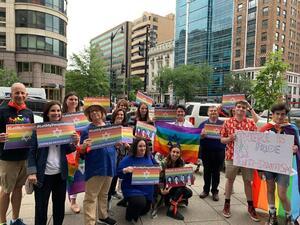
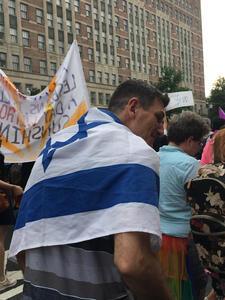
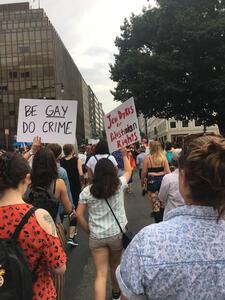
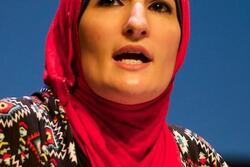

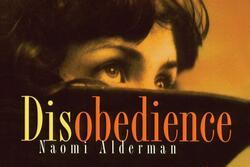


As someone who does identify as a lesbian, I find it interesting that someone who does not dismisses the protests against Dyke March as coming from outsiders. I am grateful to the straight men and Zioness’s who challenged the antisemitism. As a Jewish lesbian it is frightening when pretty much the only public lesbian space excludes me and my real symbols. The Magen David on a rainbow flag represents who I am. Not rainbow pomegranites. How patronising and colonial it was of DC Dyke March to tell me I can’t carry the actual symbol of being a gay Jew but I can carry an irrelevant fruit. I completely support making space for Palestinians, but the DC Dyke March exclusion of Jewish lesbians And the singling out of the Israeli flag validated the protestors carrying Israeli flags. ( only it and the US flag were excluded, not the flags of any other country, even those where homosexuality is punishable with death. I am also deeply pained by Israeli government actions and horrified by the use of Magen David as weapon of attack by right wing criminals. The solution is not to torture Jewish lesbians by making us eligible for participation in our own Dyke community only if we conform to the organisers’ absurdly incorrect understanding of Jewishness and What constitutes a symbol of being a gay Jew. Your use of the word “ breathless” in describing Jewish media’s calling out the antisemitism is actually a sexist insult. It is saying the voice is thin and hysterical and Without depth. Usually used to imply “ like a girl”. Why do you minimise an anti Semitic attack with a sexist slur? Would you minimise an attack against any other oppressed group? No. The protest against the Dc Dyke March does not come from “outside”, it comes from the inside of my deepest Dykiest Jewish heart.